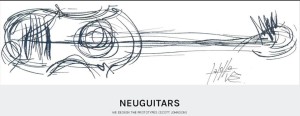https://neuguitars.com/2018/07/07/interview-with-corona-guitar-kvartet-july-2018-on-neuguitars-blog/
Interview with Corona Guitar Kvartet (July 2018)
How did start your love and interest for guitar?
As for most guitarists of our generation Andres Segovia, Göran Söllscher, Julian Bream were essential. But also listening to lots of rock-, folk- and jazz music played an important role for picking up the instrument in the first place.
How did start the idea to create the Corona Guitar Kvartet?
We were involved in starting a professionel guitar orchestra, 16 guitarists and a conductor. This was – for many different reasons – an almost impossible task, and so Bo Isholm (A wellknown Danish/Faroese guitarist, ed.) proposed, that we should
start a quartet. Actually he already had a gig booked for the quartet, before he had called to ask all the members to participate. Bo Isholm brought us together, and we will are always be grateful for that.
You have an impressive discography, so many records. It seems that you are mainly devoted to contemporary music…why this choice?
It is very interesting to work with living composers, as the creation of the music appears to be a organic collaboration between us and the composers. We prefer to play original material for guitar quartet, so our choice of playing mostly contemporary music is also due to a lack of interesting repertoire. So our idea was always to help create new and interesting repertoire for guitar quartet.
You have played music by many composers, which one was the most difficult to play?
The pieces Cori Battenti by Italian Franco Sbacco and Fluctuations by Danish Hans-Henrik Nordstrøm did cost us a lot of work, but since they are both very good and interesting works, it was a great pleasure to work with them. There are also new works by Austrian Alexander Wagendristel and Danish Lars Klit coming up i our new repertoire, which aren’t too easy to play.
Listening to your music I have found a lot of composers I didn’t know..looks like there are a lot of interesting composers in North Europe, not well known in Italy, is it possible to think about a Nordic Contemporary Way of composing? Or about a contemporary scene in North Europe?
Of course the Danish composer Per Nørgård has a lot of influence on the Scandinavian music scene, and he has an idea about the “universe of the northern mind”. On the other hand the composers here in the north are very different, that is the postmodern situation like in the whole world. However if you listen to them from outside Scandinavia, they might have many things in common, inherited from the Nørgård tradition.
Have you ever thought about a record of music composed by yourselves? Do you ever play improvisations?
Well, we have no plans in recording an entire album with own compositions. But having said that, our very own Per Dybro Sørensen is a composer too, and actually has written a very interesting piece for CGK called ’Fanfare and Variations on a Fanfare’, which very likely will appear on a CD in the future. Concerning improvisations there is often room for improvisation in the compositions, we receive from the composers. So, we as an ensemble do not concentrate on pure improvisation-sessions, but improvisation is a natural part of playing contemporary music.
How do you express your “musical form” both under execution that improvisation? How did your instruments changed the way you play and think about music?
Music will always be a mixture of execution and improvisation, as music will always happen in the moment, but always according to some sort of plan. And being guitarists of course tends to bend our bias towards lighter and crispier stuff than Händels organ-concerts. Music is a lot like bouillabaisse, where you really can’t tell which ingredient, makes it taste so good. It’s part instruments, it’s part compositions amd it’s part personal. But it’s impossible to distinguish, which is which.
What are your next projects? What are you working on?
Autumn ’17 and Spring ’18 We are in the middle of our Autumn ’17(Spring ’18- tour of Denmark. We are be playing thirteen works (eleven by Danes, two by foreigners; twelve of them world premieres.) We also be play an old favourite, John Frandsen’s Three Dances from 1994, which first appeared on our second album, Northpoints (03); this piece has attained classic status and we enjoy very much playing it again. In the first 3 recitals of the tour we have premiered works by Eirik Moland, Michael Bønsdorf, Svend Aaquist, Bo Andersen and Michael Schelle (USA) – the premieres in the spring include works by Peter Bruun, Bo Gunge, Lars Klit, Karl Petersen, Roland Haraldson, Niels Mølgård and Alexander Wagendristel (Austria). We consider all of these to be very exciting composers with widely different approaches. Some are experienced composers – heavyweights in Danish music – others are up-and-coming, often with an impressive list of credits as performing musicians. Following up on the tour we plan to make a recording.
Last question, let’s try to turn to the music the three questions of J.P.Sartre towards literature: Why do you make music? And again: what is the place of those who make music in contemporary society? To what extent can music contribute to the evolution of this society?
Well, it’s definitely not for fame and fortune … We make music, because that’s what we do. It is our, craft. our trade and our dna. We make music because we have to and because we can. We make music for the beauty of it. The musicians place in society is that of a pillar of aestethics and culture in a world of economy and technology. It is our mission as musicians to disrupt the current ”unnatural order of things” and to open the lid a little bit – both to let out some steam, but just as much to let in a little beauty.

